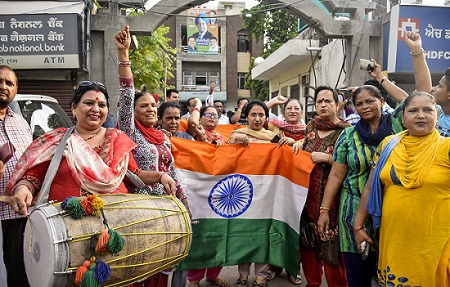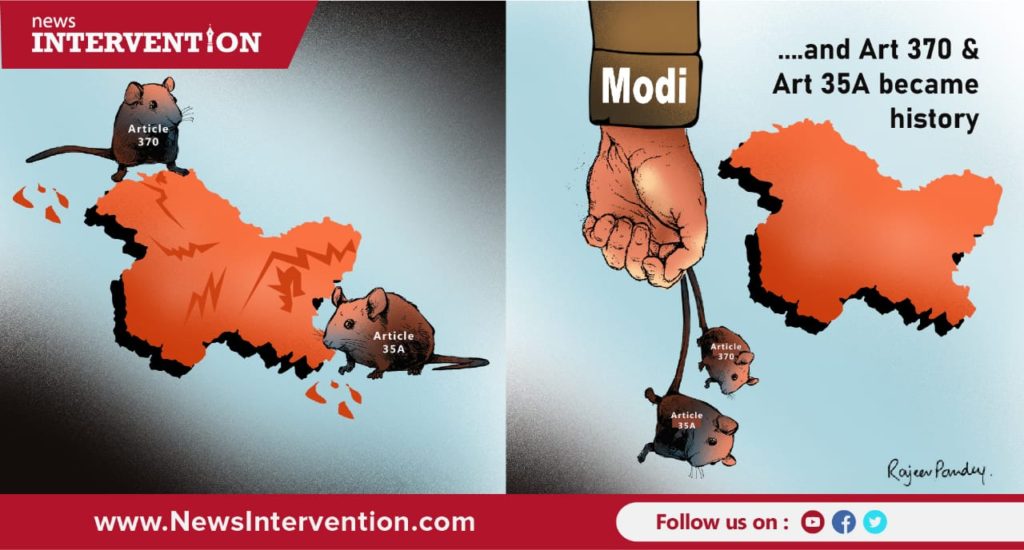
If rhetoric alone was the deciding factor on the issue of Kashmir, then Pakistan would undoubtedly have won its case hands down. Fortunately, things don’t happen that way in real life, something which the powers that be on the western side of the Radcliffe Line also know very well. Otherwise, why else would it have tried to annex Kashmir in 1965 [‘Operation Gibraltar’] by carrying out large scale infiltration of Pakistan Army personnel disguised as ‘razakars’ (civilian volunteers) to foment an insurrection in Kashmir Valley to facilitate its capture?
Having failed miserably to resolve the Kashmir issue militarily, Islamabad cunningly reverted to making UNSC resolutions as mainstay of its Kashmir case and by selectively interpreting its text, cobbled together a narrative that was so unconvincing that it never gained global acceptance. On the other hand, New Delhi put across its case on Kashmir lucidly, which is compelling and hence it has been recognised by an overwhelming majority of the international community. Unfortunately, India failed to counter Pakistan’s fallacious narrative on Kashmir with the resoluteness that it deserved, giving Islamabad a godsent opportunity to cite New Delhi’s silence as the manifestation of its guilt.
Islamabad’s Kashmir narrative may not have found traction within the international community but its use of bombast to compensate the inherent weakness in its Kashmir narrative did strike a chord with the masses on both sides of the LoC. Consequently, by portraying India as an ‘illegal occupier’ of J&K, Pakistan was able to prop-up the ‘azadi’ [freedom] movement here and with lavish use of funds, sustain it through proxies led by All Parties Hurriyat Conference [APHC].
That senior APHC leader Syed Ali Shah Geelani resigned in disgust due to rampant financial irregularities within this separatist conglomerate and AHPC becoming practically inactive after the center’s massive clampdown on its illegal sources of funding, is ample proof that the so called ‘self-determination struggle’ is not driven by ideology but by money!

While New Delhi remained smug about Islamabad’s Kashmir disinformation campaign, Islamabad too was lulled into such complacency that it didn’t even bother to realise that a narrative built on falsehood is bound to collapse someday. This happened on August 5, 2019 when the government of India revoked Article 370 of the Indian Constitution that gave ‘special status’ to J&K. This decision literally pulled the carpet from beneath Islamabad’s feet, as is more than obvious from the cacophony of ludicrous statements that emanated from Pakistan in its wake.
That this move also caught Prime Minister Imran Khan completely unaware is evident from his weird response, which besides being hilarious, also bordered on the ridiculous- like terming Article 370 abrogation as “illegal” and alleging that it “violates” UNSC resolutions. Even a person with the most rudimentary knowledge will tell you that every democratically elected government has the sovereign right to amend the country’s constitution– so Khan’s contention is laughable. Next, as making changes in the constitution is unquestionably an internal matter of the concerned country, by no stretch of imagination can this be considered as violation of any completely disassociated and external decree-like the UNSC resolutions!
The list of howlers from the cricketer turned Prime Minister of Pakistan doesn’t end here. According to him, by abrogating Article 370, New Delhi has “Gone against [Indian] Constitution… against a verdict of their Supreme Court as well as against that of J&K High Court.” Even if we, purely for the sake of discussion, accept Khan sahib’s argument, then the question that arises is-why is he so perturbed? If Article 370 really violates the Indian Constitution, then wouldn’t India’s opposition political parties and judiciary be more concerned and initiate appropriate action to rectify this irregularity? Lastly, as far as the abrogation going against court verdicts is concerned, doesn’t Khan know that in a democracy, the executive has constitutional authority to overrule the judiciary?
Similarly, he contends that Article 370 abrogation violates UNSC and UNGA resolutions on Kashmir. Once again, it appears that just like the institutionalised persecution of Uighur Muslims of China’s Xinjiang Autonomous Region by Beijing, Khan is also unaware of what’s mentioned in UNSC/UNGA resolutions on Kashmir. Granting special status to J&K under Article 370 was a decision taken by government of India without any reference to UN resolutions or directions from UNSC and so, how does its revocation violate UN regulations defies comprehension!
However, Khan’s argument that Article 370 abrogation goes against Shimla Agreement is what takes the cake, because while replying to Pakistan’s request for UN to play its “due role” on this issue, UN Secretary General’s spokesperson Stephane Dujarric referred to this very agreement as the ‘mantra’ for diffusing the Article 370 abrogation faceoff. He said that the Secretary-General “recalls the 1972 Agreement on bilateral relations between India and Pakistan, also known as the Shimla Agreement, which states that the final status of Jammu and Kashmir is to be settled by peaceful means, in accordance with the Charter of the United Nations.”
With Islamabad getting no meaningful support from both UN and the international community for its crusade against Article 370 abrogation, it’s abundantly clear that through this move, New Delhi has checkmated Islamabad’s pompous narrative on Kashmir. It has also sent out an unambiguous message to the world that J&K is very much part and parcel of India, and absence of any worthwhile objections clearly indicates that it has global acceptance!
So, while this move has come as a big setback for Islamabad as it has pulverised Pakistan’s Kashmir narrative, for Prime Minister Imran Khan, it’s become a source of personal embarrassment. Let’s not forget that it has given the likes of Pakistan Peoples Party (PPP) chairman Bilawal Bhutto a chance to take a swipe at him by saying “Earlier, Pakistan’s policy on Kashmir was on how we will take Srinagar. Now, under Imran Khan’s government, we have been forced to think on how we will save Muzaffarabad”!
An associated negative fallout for Khan is that none of the startling predictions that he had so confidently made, have come to pass. He repeatedly prognosed a “false-flag operation” by India that would graduate into conventional war as Pakistan exercised its right to self-defence and thereafter culminate in a nuclear exchange.
But this didn’t happen!
Khan used the UNGA podium to caution the world that Kashmir was on the brink of Armageddon and his warning was indeed very scary. Saying, “You think Kashmiris will accept a new status quo under revocation of Article 370,” he posed a petrifying question- “What will happen when the curfew is lifted?” Then again asking the audience “But what will happen when 8 million Kashmiris come out of a lockdown and face 900,000 troops,” he, à la Nostradamus prophesised, “I fear there will be a bloodbath”!
This too didn’t happen!
It’s but natural that the severe embarrassment caused to Khan has made abrogation of Article 370, a personal issue for him. Similarly, Pakistan Army chief Gen Qamar Javed Bajwa too is smarting under the ignominy of having been compelled to enter into a ceasefire agreement with Indian Army due to unacceptably high fatalities being suffered by Pakistani troops on LoC. So, with those at the helm of affairs in Islamabad and Rawalpindi not being in a reconciliatory mood, the likelihood of any Indo-Pak dialogue or normalcy in relations in the foreseeable future is practically zero!
Consequent to Article 370 revocation, it appears that Islamabad is perhaps changing the thrust of its Kashmir strategy. From its traditional demand that the ‘K’ issue be resolved once for all as per the aspirations of Kashmiris, Khan is now talking about a two-stage process- first, wanting Kashmiris to accede to Pakistan through a plebiscite and thereafter, holding yet another referendum in which “Kashmiri people will be asked to decide whether they want to live with Pakistan or as an independent nation.” Though it may sound bizarre and impractical, but this new move nevertheless needs to be neutralised before it takes root in gullible minds.
New Delhi’s diplomatic offensive to proactively unmask Islamabad’s duplicity on J&K is in dire need of invigoration and here is a good opportunity to do so. Para 7(3) of the so-called ‘Azad J&K Interim Constitution, 1974’ stipulates that “No person or political party in Azad Jammu and Kashmir shall be permitted to propagate against, or take part in activities prejudicial or detrimental to, the ideology of the State’s accession to Pakistan.”
So, in this case, all that’s needed is highlighting the fact that when Kashmiris living under Pakistani occupation cannot even “propagate against, or take part in activities prejudicial or detrimental to, the ideology of the State’s accession to Pakistan,” then on what basis should Kashmiris trust Khan’s promise that Islamabad will give them the choice to decide “whether they want to live with Pakistan or as an independent nation”?
